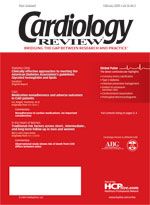Publication
Article
Does ultrafiltration for heart failure show promise?
Author(s):
The literature is replete with studies of treatments for chronic heart failure that have shown morbidity and mortality benefits.
The literature is replete with studies of treatments for chronic heart failure that have shown morbidity and mortality benefits. Unfortunately, there are no therapies for acute decompensated heart failure (ADHF) showing similar positive effects on outcomes. Since their introduction in the early 1960s, loop diuretics have been considered the cornerstone of treatment for ADHF. This has been done with no studies evaluating the effects of diuretics on outcomes, and some data showing worsening survival in patients treated chronically with diuretic therapy.1
The first use of ultrafiltration for treatment of heart failure was reported more than 20 years ago.2 These studies used large hemodialysis machines and patients required central venous access. Advances in technology have allowed for the development of machines that are small and portable with ultrafiltration being performed via peripheral venous access. Theoretic advantages of this technology over standard diuretic therapy include the ability to remove large volumes of fluid without adversely affecting electrolyte balance, a decrease in neurohormonal activation, and greater net loss of sodium, as the ultrafiltrate is isotonic compared to hypotonic fluid removed using diuretics.
The current study by Bart and colleagues assesses the safety and efficacy of ultrafiltration in patients admitted with ADHF and volume overload. Twenty patients were randomly assigned to usual care, and 20 patients to usual care plus a single 8 hour session of ultrafiltration performed during the first 24 hours of hospitalization. Ultrafiltration was performed by ward nurses with a 35 cm, 16-gauge withdrawal catheter being placed in the antecubital vein and a standard peripheral IV used as the return line.
Fluid removal at 24 hours was significantly greater in the ultrafiltration group compared to usual care (4650 mL vs 2838 mL, P = .001), with no significant difference in weight loss between the 2 groups. Symptom relief was greater in the ultrafiltration group at 48 hours as assessed by global heart failure symptoms (P = .039) and dyspnea symptoms (P = .023). There were no significant differences in terms of electrolyte abnormalities or blood urea nitrogen (BUN) and creatinine levels.
Costanzo and colleagues performed a nonrandomized study in which they removed on average 8654 ± 4205 mL of fluid without significant change in electrolytes, BUN, or creatinine in 20 patients admitted with ADHF.3 From these 2 studies we can conclude that ultrafiltration can be used in the treatment of heart failure patients for the safe removal of large amounts of fluid.
Some of the questions regarding the impact of ultrafiltration on outcomes have been answered by the UNLOAD trial, which was presented in March 2006 at the American College of Cardiology Annual Scientific Sessions.4 This was a multicenter study including 200 patients with ADHF randomized to ultrafiltration or usual care. Ultrafiltration was associated with greater fluid removal (4600 mL vs 3300 mL, P = .001) and a reduction in 6-month rehospitalization rates (18% vs 32%, P = .002) and unscheduled office or emergency department visits (21% vs 44%, P = .009).
Other issues remain unanswered, including determining which patients with ADHF should be treated with ultrafiltration, and the fact that repeated use in the same individual will result in loss of peripheral access. The cost of treatment also needs to be evaluated, with the device costing about $19,000 and replaceable filters costing about $900 per session. These costs may be offset by reduced costs of patient readmission. The mechanisms of the long-term benefits also remain unclear. These questions should be answered through additional clinical trials.






